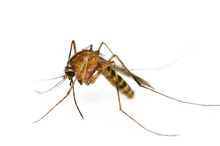State health officials in Wisconsin have confirmed that two horses in north central Wisconsin have tested positive for Eastern Equine Encephalitis. According to state agricultural officials, one horse in Clark and one in Lincoln counties have been confirmed to have the mosquito-borne encephalitis after tests were performed at a national laboratory in Ames, Iowa.

Mosquito bites = horse diseases
Horse owners who have not vaccinated their animals for mosquito-borne diseases including Eastern Equine Encephalitis and West Nile should take new cases as a warning.
State veterinarian Robert Ehlenfeldt said mosquito populations have grown during a relatively wet summer and there may be more cases if the first killing frost doesn’t come until late in the fall. Ehlenfeldt said horse owners who have not vaccinated their animals for mosquito-borne diseases should take the new cases as a warning – and those who did take action should check with veterinarians to see if their horses need a booster shot.
West Nile Virus has also started to make its presence known in Wisconsin. Although horses are susceptible to West Nile, there have been no equine cases reported so far this year. Birds in 14 counties have died from the virus, and a resident of Dodge County was hospitalized and later sent home after becoming the first person in Wisconsin to contract the West Nile virus this year.
Prevent your horses from getting mosquito-borne diseases
The best prevention is controlling mosquitoes to prevent infected mosquitoes from biting the horse. Mosquito breeding areas should be removed by clearing away any potential sources of water in which mosquitoes can breed. This includes old tires, clogged roof drains, wading pools, wheelbarrows, bird baths, empty containers of all kinds, unused or neglected swimming pools and spas, puddles left after rainfall, neglected water troughs, or any other items or areas where water might become trapped.
Steps should be taken to limit the horses' exposure to mosquitoes by keeping them indoors during peak mosquito activity periods, such as dawn and dusk. Stalls should be screened whenever possible and fans installed over horses to help deter mosquitos.
Since mosquitoes are attracted to light, avoid turning lights on in the stalls during the evening or overnight. Placing incandescent bulbs around the perimeter of the stable or use of electric bug zappers will draw mosquitoes away from the horses. Also, birds, including chickens, should not be living in or close to the stable.
